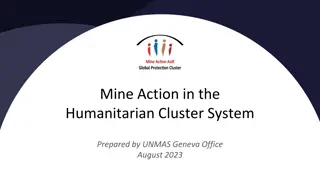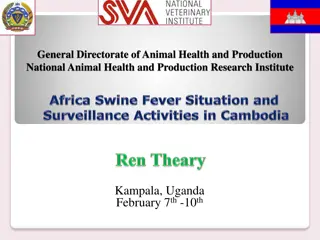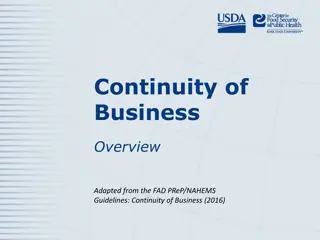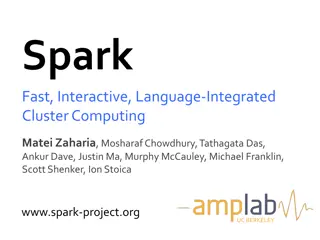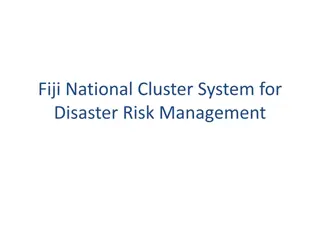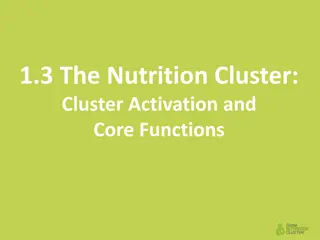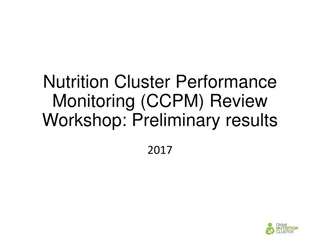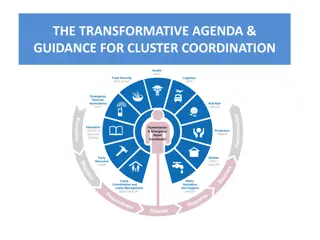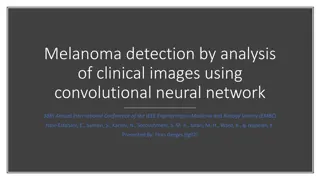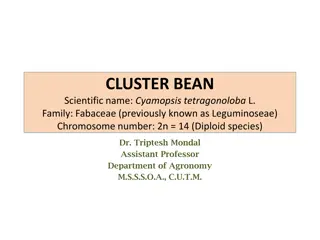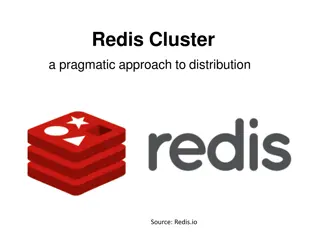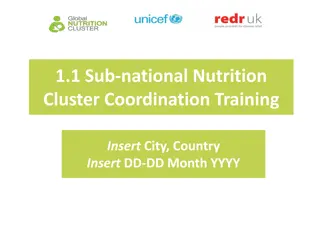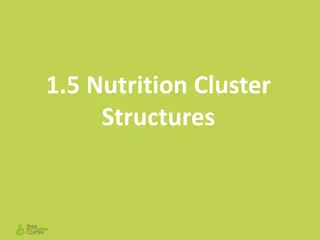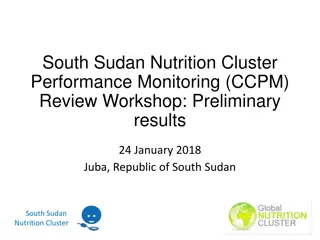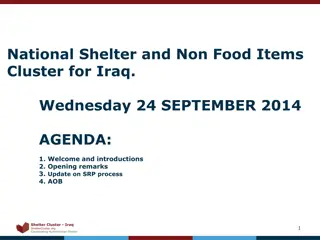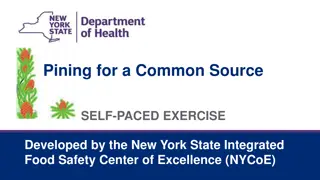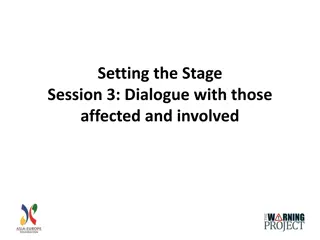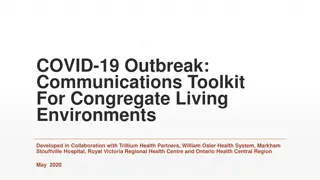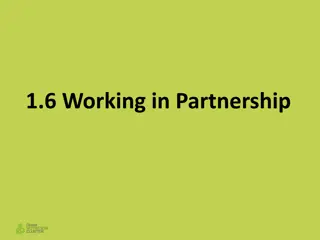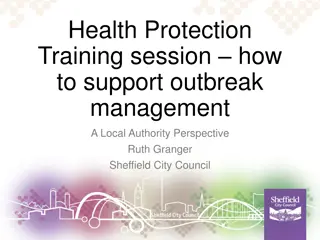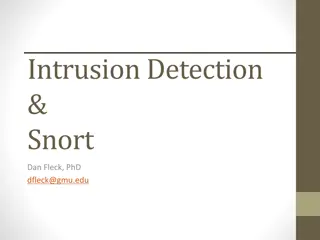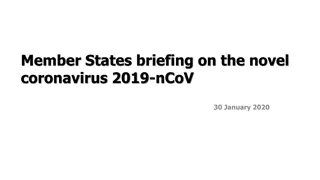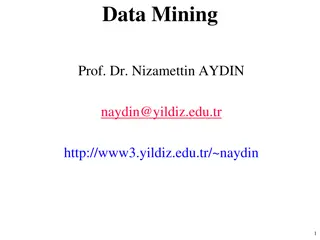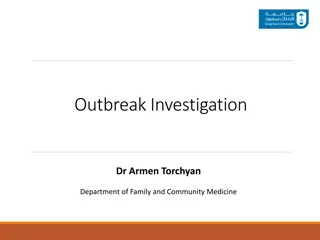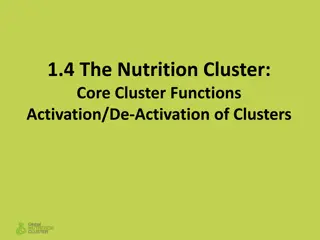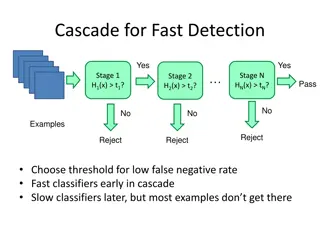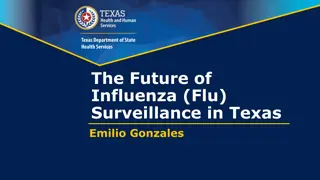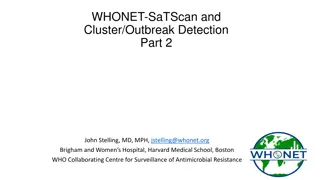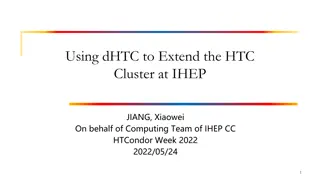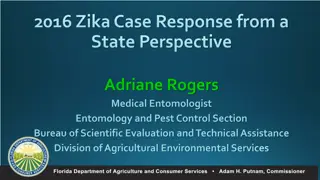Mine Action in the Humanitarian Cluster System
The Inter-Agency Standing Committee (IASC) plays a crucial role in coordinating humanitarian efforts, with a focus on mine action in the global protection cluster. This involves clear responsibilities, strategic planning, and advocacy to address humanitarian needs. The IASC Reference Module for Clus
3 views • 18 slides
ASF Outbreak Surveillance and Control Strategies in Cambodian Pig Farming
An overview of the African Swine Fever (ASF) outbreak in Cambodia, highlighting the detection of outbreaks in various provinces, outbreak containment efforts, common pig diseases in Cambodia, surveillance objectives, and sampling methods for ASF detection in pigs. The initiative aims to prevent ASF
0 views • 20 slides
Comprehensive Overview of Continuity of Business in FAD Outbreaks
Continuity of Business (COB), also known as managed movement, is a crucial strategy that allows the movement of non-infected animals and non-contaminated animal products during a Foreign Animal Disease (FAD) outbreak. This approach helps maintain normal business operations in agriculture and food in
4 views • 27 slides
Understanding Apache Spark: Fast, Interactive, Cluster Computing
Apache Spark, developed by Matei Zaharia and team at UC Berkeley, aims to enhance cluster computing by supporting iterative algorithms, interactive data mining, and programmability through integration with Scala. The motivation behind Spark's Resilient Distributed Datasets (RDDs) is to efficiently r
0 views • 41 slides
Wood Innovation Cluster: Driving Regional Growth and Development in the Wood Industry
The Wood Innovation Cluster, established in 2018 in Skellefte municipality, brings together key stakeholders in the wood industry to foster regional growth and development. It coordinates research, development, education, and testing activities while promoting sustainable procurement. Through collab
0 views • 4 slides
Nutrition Cluster Core Functions Overview
The content provides a detailed overview of the core functions of the Nutrition Cluster, focusing on objectives, core functions, group work activities, and explanations on supporting service delivery, informing strategic decision-making, and advocacy. It highlights the importance of cluster coordina
1 views • 19 slides
Fiji National Cluster System for Disaster Risk Management
The Fiji National Cluster System for Disaster Risk Management emphasizes the importance of coordination in emergencies, aiming to reduce gaps and overlaps through a coherent, complementary approach. Global Cluster coordination systems have been adopted to enhance collaboration among various humanita
1 views • 22 slides
Guidelines for Media Reporting on Gender-Based Violence: Roles and Functions of GBV Sub-Cluster
Comprehensive guidelines for media reporting on Gender-Based Violence (GBV) covering the roles and responsibilities of the GBV Sub-Cluster, the coordination structure, functions of the GBV Sub-Cluster, and basic concepts of GBV including different forms of violence. The document emphasizes the impor
2 views • 36 slides
Inter-Cluster Coordination and Information Management in Humanitarian Emergencies
Inter-Cluster Coordination and Information Management play vital roles in humanitarian emergencies. The coordination mechanism involves regular meetings convened by the RC/HC and coordinated by OCHA, providing opportunities for clusters to collaborate on shared planning, needs assessments, and poole
3 views • 13 slides
Understanding the Nutrition Cluster Activation and Core Functions
Exploring Level 3 emergencies, the process of cluster activation and deactivation, and the core functions of the Nutrition Cluster at the country level. Learn about the criteria for cluster activation, gaps in response, and the strategic approach to humanitarian system-wide emergency activation. Dis
3 views • 21 slides
Nutrition Cluster Performance Monitoring (CCPM) Review Workshop Preliminary Results 2017
The Nutrition Cluster Performance Monitoring (CCPM) aims to ensure efficient coordination, identify areas for improvement, raise support awareness, and enhance transparency within the cluster. The process involves planning, conducting surveys, analysis, action planning, and monitoring. It does not m
1 views • 14 slides
Transformative Agenda and Guidance for Effective Cluster Coordination
Explore the transformative agenda and guidance for cluster coordination, emphasizing the roles of UNICEF as a cluster lead agency, core cluster functions, inter-cluster coordination, and management strategies for effective humanitarian response. Key focus areas include accountability, human financin
1 views • 19 slides
Automated Melanoma Detection Using Convolutional Neural Network
Melanoma, a type of skin cancer, can be life-threatening if not diagnosed early. This study presented at the IEEE EMBC conference focuses on using a convolutional neural network for automated detection of melanoma lesions in clinical images. The importance of early detection is highlighted, as exper
0 views • 34 slides
Overview of Cluster Bean (Cyamopsis tetragonoloba L.) - Uses, Distribution, and Classification
Cluster beans, scientifically known as Cyamopsis tetragonoloba L., are valuable leguminous crops with economic importance due to their drought tolerance and industrial applications, particularly in gum production. They are cultivated for feed, fodder, and vegetable purposes, with their seeds rich in
5 views • 14 slides
Understanding Redis Cluster Distribution Approach
Redis Cluster offers a pragmatic approach to distribution, connecting all nodes directly with a service channel. Each node communicates using a binary protocol, optimized for bandwidth and speed. Nodes do not proxy queries, and communication involves messages like PING, PONG, and Gossip. Hash slot k
0 views • 17 slides
Sub-national Nutrition Cluster Coordination Training Workshop
Welcome to the Sub-national Nutrition Cluster Coordination Training Workshop aimed at sharing key concepts, tools, and approaches for effective coordination of nutrition in emergencies. This training prepares participants for working in Nutrition Cluster/Sector Coordination, promoting dialogue and s
1 views • 10 slides
Understanding Nutrition Cluster Structures and Roles
Learn about the structures and roles within Nutrition Clusters at different levels, including the responsibilities of key actors such as the Cluster Coordinator, Information Manager, Strategic Advisory Group, and Technical Working Groups. Explore the involvement of governmental and non-governmental
0 views • 27 slides
Colorimetric Detection of Hydrogen Peroxide Using Magnetic Rod-Based Metal-Organic Framework Composites
Nanomaterials, particularly magnetic rod-based metal-organic frameworks composites, are gaining attention for their exceptional properties and various applications in different fields. This study by Benjamin Edem Meteku focuses on using these composites for colorimetric detection of hydrogen peroxid
0 views • 16 slides
Review of South Sudan Nutrition Cluster Performance Monitoring Workshop
Preliminary results from the South Sudan Nutrition Cluster Performance Monitoring (CCPM) Review Workshop held in Juba, Republic of South Sudan on 24th January 2018. The workshop aimed to ensure efficient coordination, identify areas for improvement, raise awareness of support needed, and strengthen
0 views • 18 slides
National Shelter and Non-Food Items Cluster for Iraq - Summary and Data Overview
The National Shelter and Non-Food Items Cluster meeting in Iraq on Wednesday, 24th September 2014 discussed various important agenda items including updates on the SRP process, strategic objectives, overview of cluster projects, types of assistance provided, and targeting vulnerable groups. A total
0 views • 7 slides
Foodborne Illness Outbreak Investigation Procedures and Protocols
In this self-paced exercise developed by the New York State Integrated Food Safety Center of Excellence, learners will delve into the intricacies of investigating foodborne illness outbreaks. The course covers topics such as identifying outbreak patterns, roles in outbreak investigations, interpreti
0 views • 171 slides
Addressing Challenges in Controlling EATEX-D Outbreak
The session explores the challenges in controlling the EATEX-D outbreak, including the death rate, transmission modes, and public response. It delves into specific issues like concentrated cases in Downville and the effectiveness of self-quarantine strategies. The dialogue captured from social media
0 views • 24 slides
COVID-19 Outbreak Communications Toolkit for Congregate Living Environments
This communications toolkit, developed in collaboration with multiple health organizations, provides guidance and resources for managing communication during a COVID-19 outbreak in congregate living environments. It includes information on processes, notifications, web updates, media relations, key
0 views • 34 slides
Overview of GRANDproto Project Workshop on Autonomous Radio Detection
GRANDproto project workshop held in May 2017 focused on improving autonomous radio detection efficiency for the detection of extensive air showers (EAS). Issues such as detector stability and background rates were discussed, with the goal of establishing radio detection as a reliable method for EAS
1 views • 14 slides
Timely Leak Detection San Diego | Professional Leak Detection Services
Protect your home with expert leak detection services in San Diego. Avoid costly water damage and health risks with timely detection of hidden leaks. Schedule today!\n\nKnow more: \/\/ \/san-diego-slab-leak-detection\/
0 views • 7 slides
How Professional Leak Detection Can Save Your San Diego Home | Leak Detection Sa
Protect your home from costly damage with professional leak detection in San Diego. Learn about expert services like slab leak detection, non-invasive testing, and more. Save money and prevent water damage with top San Diego leak detection services.\
0 views • 8 slides
Nutrition Cluster Partnership Essentials
Discover the minimum commitments for engaging in the Nutrition Cluster, learn about partnership principles, and understand how these guide collaborative efforts within the cluster. Explore partner commitments, principles of partnership, and engage in an exercise to apply these concepts practically.
0 views • 7 slides
Health Protection Training for Outbreak Management: A Local Authority Perspective
This training session, led by Ruth Granger from Sheffield City Council, focuses on supporting outbreak management from a local authority perspective. Participants will learn about the importance of health protection, the role of the Public Health representative in outbreak control teams, and the key
0 views • 41 slides
Understanding Intrusion Detection Systems (IDS) and Snort in Network Security
Intrusion Detection Systems (IDS) play a crucial role in network security by analyzing traffic patterns and detecting anomalous behavior to send alerts. This summary covers the basics of IDS, differences between IDS and IPS, types of IDS (host-based and network-based), and the capabilities of Snort,
0 views • 34 slides
Global Update on Novel Coronavirus Outbreak - January 2020
The evolving situation of the 2019-nCoV outbreak, with updates on confirmed cases, deaths, and affected countries. As of January 30, 2020, there are 7,818 laboratory-confirmed cases globally, with the majority in China. The outbreak has spread to several countries, prompting health emergencies progr
0 views • 15 slides
Exploring the Social Change & Campaigning Learning Cluster
This slide deck explores the Social Change & Campaigning Learning Cluster conducted by the Sheila McKechnie Foundation. It delves into the aims of the cluster, participants, new skills acquired, and next steps. The learning clusters were designed to go beyond one-day events, providing residents with
0 views • 29 slides
Understanding Anomaly Detection in Data Mining
Anomaly detection is a crucial aspect of data mining, involving the identification of data points significantly different from the rest. This process is essential in various fields, as anomalies can indicate important insights or errors in the data. The content covers the characteristics of anomaly
0 views • 50 slides
Outbreak Investigation and Management in Public Health
Outbreak investigation is crucial in understanding, distinguishing, and managing disease outbreaks. This involves identifying the nature of outbreaks, studying key terms like endemic and epidemic, and examining outbreak settings such as food-borne and water-borne scenarios. By investigating outbreak
0 views • 53 slides
Nutrition Cluster Core Functions and Activation Strategies
The Nutrition Cluster aims to support service delivery, inform strategic decision-making, and plan and implement cluster strategies to address the needs and priorities of affected populations. Core functions include supporting service delivery, advocacy, capacity-building, and monitoring and evaluat
0 views • 19 slides
Object Detection Techniques Overview
Object detection techniques employ cascades, Haar-like features, integral images, feature selection with Adaboost, and statistical modeling for efficient and accurate detection. The Viola-Jones algorithm, Dalal-Triggs method, deformable models, and deep learning approaches are prominent in this fiel
0 views • 21 slides
Enhancing Influenza Surveillance in Texas: Strategies and Goals
Emilio Gonzales presents a comprehensive plan for advancing influenza surveillance in Texas, focusing on considerations, goals for the upcoming flu season, and strategies to increase participation in surveillance programs. The plan includes enhancing respiratory disease surveillance, expanding senti
0 views • 15 slides
Winter Planning and Outbreak Control Measures for Health Protection Team
In preparation for winter, Penny Edwards from the South West Health Protection Team outlines key strategies for prevention, preparedness, and protection against respiratory illnesses such as COVID-19 and flu. The guidance emphasizes social distancing, hand hygiene, staff training on PPE usage, regul
0 views • 5 slides
WHONET-SaTScan and Cluster Outbreak Detection Webinar Series
Explore WHONET's webinar series on SaTScan and cluster outbreak detection, featuring insightful sessions on analysis parameters, software demonstrations, cluster detection strategies, statistical signal validation, data preparation, and more to enhance antimicrobial resistance surveillance.
0 views • 37 slides
Extending IHEP's HTC Cluster Using dHTC
IHEP is extending its HTC cluster to accommodate the data processing needs of over 15 experiments in the field of high energy physics. The motivation behind this expansion includes the need for more resources, existing data processing limitations, and user preferences for local analysis. The cluster
0 views • 21 slides
The 2016 Zika Outbreak in Florida: State Response and Control Measures
In 2016, Florida experienced a Zika virus outbreak leading to public health emergency declarations and mosquito control initiatives. The outbreak began with travel-associated cases, followed by locally acquired transmissions prompting the implementation of aggressive mosquito control measures. Vario
0 views • 22 slides
